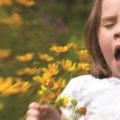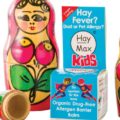Hay Fever Season: Be Prepared
Hay fever is an allergy to pollen, the powder produced by plants and trees used to fertilise other plants or trees of the same species. Grass pollen allergy is the commonest cause of hay fever and affects people May to June (during exam season). However tree pollens affect people February to May and weed pollens from spring to late autumn.
What causes hay fever?
Histamine, the chemical that causes allergic reactions, is released form the cells lining the nose and eyes, when they encounter any foreign substances. This causes a reaction similar to nettle stings, that is itching and swelling, and can affect the eyes, nose, throat and sinuses.
How common is hay fever?
Hay fever is very common, affecting 20% of people. It usually starts in school aged children
It also runs in families and is more common in people who also have asthma and eczema.
Symptoms of hay fever.
Each patient has slightly different symptoms but it is likely that they will have some, if not all of the symptoms listed below:
- Runny, itchy and blocked nose Sneezing
- Loss of sense of smell Catarrh
- Sore or itchy throat Itchy and watery eyes
- Sinus (face) pain Headache
- Asthma
Treatments
-
Avoidance of pollen
Look at the pollen count on TV, newspapers and on many weather Apps
If the pollen count is high:
Stay indoors as much as possible, keeping windows and doors shut.
Avoid mowing the lawn.
Shower and wash your hair after being outdoors.
Keep car windows shut and when your car is serviced ask for pollen filters to be changed or added. -
Antihistamines
Antihistamines stop histamine from causing the body’s reactions to foreign substances, such as pollen. They can be taken as medicine, tablet or nasal spray. They tend to work within an hour of being taken and ease most of the symptoms (not as good at easing the nasal congestion). They work best when taken every day rather than intermittently. Usually non-drowsy antihistamines are prescribed BUT every year some patients tell me they made them feel sleepy so DO NOT drive or operate machinery if you are affected, see your GP or pharmacist who can change you to a different antihistamine. They are NOT to be taken if you may be pregnant or are breast feeding.
-
Steroids
Steroid nose sprays work by reducing inflammation and swelling in the nose. This reduces the sneezing and runny, itchy, blocked nose. They can take up to 2 weeks to start working and should be ideally started a few weeks prior to the usual start of hay fever symptoms.
They should be taken with the antihistamines. Side effects are rare but they can irritate the lining of the nose. Your GP will be able to prescribe something to help.Sometimes a 1 week course of oral steroids can be prescribed if other treatments have not worked. This is often prescribed just before examinations. However, there are side effects from steroids that may affect performance and they cannot be taken for very long.
-
Eye drops
These are taken with antihistamines and steroid nose sprays and help reduce the release of histamine so reducing the itchy, watery eyes
-
Decongestants
Sometime the nasal congestion symptoms are quite debilitating causing disturbed sleep, headaches and making the sufferer feel generally miserable. Decongestants are not licensed for small children but can provide a short term relief when symptoms are very bad. They MUST NOT be used for more than a week.
-
Hyposensitisation (a course of vaccines containing the allergen)
This is only considered for persisting severe symptoms. Hyposensitisation requires supervision by a specialist. It does not cure hay fever but can greatly reduce the severity of symptoms and may give long lasting benefit for years after the treatment has been stopped.
If you are unsure which would be the best treatment for your hay fever, please make an appointment with your GP.






“…pollens affect people February to May …” – not exactly the case. It depends on the kind of trees you’re allergic to. Several years ago it was the map of allergy seasons for some for some plants in a lot of newspapers, something like that:
And you could see that some trees give pollen in midsummer. As for grasses – they cut it, it regrow and start producing pollen again and it comes in cycles…
Thanks for the chart! Pollen count is on constant VH for the last few weeks. My DD is suffering so much that my love of hot weather diminishing by the day 🙁
I suffer from really bad hay fever and never knew that alcohol worsens it ekkkk!!! Good to no 🙂
I have found that using the Weleda homeopathic tablets have helped prevent hayfever for me this year